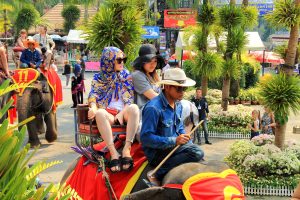On October 16, the Chinese Communist Party (CCP) opened its 20th National Party Congress to one, announce a major leadership shuffle and two, review China’s achievements over the last five years, thereby charting a course for the coming five years. Much of the international discussion has seemed to focus on President Xi Jinping’s tightening grip on authority, which marks a shift from China’s old-school leadership transition (post-Deng Xiaoping era) and could ultimately put Xi on par with Chairman Mao Zedong. While this development certainly deserves attention, the CCP’s work report is what truly matters in the eyes of observers in Thailand.
As The Diplomat’s editor-in-chief Shannon Tiezzi wrote in these pages recently, the CCP’s work report delivered by Xi highlights China’s prioritization of stability and continuity over growth and change. Despite problems and predictions of doom, the “zero-COVID” policy will not be scrapped or even eased in the near future. And, as opposed to popular expectations (especially in the West) that Xi will adopt a more confrontational stance on Taiwan, Xi’s Taiwan approach remains unchanged. He stressed that the “complete reunification of the nation absolutely must be realized” but, as Wen-Ti Sung at the Australian National University observed, did not touch on the “when” or “how.”
Unlike, say, Japan and the Philippines, which might pay more attention to the Taiwan question, Thailand’s biggest concern appears to be the zero-COVID policy. This is not to say that Thailand does not care about the prospect of China’s armed unification with Taiwan. But, as a neutral nation in a relatively safe geographical position, should China and the U.S. clash over Taiwan, Thailand does not need to think about engaging in combat or providing logistical support in the way Japan and the Philippines do.
What will make or break the Thai economy, however, is the speed and extent of China’s economic reopening. Thailand is, after all, heavily reliant on China in all dimensions: exports and imports, tourism, and investment.
According to Thailand’s widely read economic blog Longtunman, the year 2021 saw Thailand exporting a total of 8.5 trillion baht worth of goods, of which about 1.2 trillion baht, or about 14 percent of overall exports, went to China. Simultaneously, 24 percent of Thailand’s total imported goods came from China. Needless to say, Thailand is extremely vulnerable to the CCP’s sudden lockdown orders. Shanghai, for instance, accounts for 27 percent of Chinese exports to Thailand, and when the city was undergoing a strict two-month lockdown earlier this year, many Thai companies pretty much ran out of the materials necessary for the production of electric appliances such as air conditioners and cables. Similarly, the export of Thai durians – now one of Thailand’s top exported products – to China was temporarily stopped back in April after the Chinese border inspectors detected traces of COVID-19.
Then there is Thailand’s grudging reliance on Chinese tourists. On the one hand, the Thais recognize that massive arrivals from China are crucial to boosting Thai tourism. On the other hand, many local Thais are not fond of Chinese tourists and are anxious about the existence of “zero-dollar tours,” in which budget Chinese tourists are pressured by their tour operators to purchase from approved (and often Chinese-owned) stores only and actually contribute very little to local businesses. The pandemic, which has removed Chinese tourists from the equation, and inflation, which has resulted in higher travel costs, have urged the Thai government and businesses alike to devote more attention to “quality” tourists who stay longer and spend more. Adding to existing markets in Asia and Europe, the Thai government has reached out to high-potential customers in India and the Middle East. The problem is that the void left by Chinese tourists is simply just too large.
Even with an influx of “quality” tourists, Thailand probably still needs Chinese tour groups to keep “everyone” in its hospitality industry fed and happy. High-spending tourists, particularly those on health and wellness trips, naturally prefer to stay at high-end accommodations, be it independent boutique hotels or chained-brand hotels. Smaller businesses are then left behind, and they have further been weakened by rising operational costs stemming from inflation, higher interest rates, and this month’s minimum wage hike of 5.02 percent.
Investment is another important aspect. Statistics from the Real Estate Information Centre published by the Bangkok Post reveal that Thailand’s foreign condominium investment market has been dominated by Chinese buyers, with over 7,600 condominium transfers (by unit) nationwide in 2018 and 2019. In contrast, there were around 800 and 300 condominium units transferred to Russian and American nationals, the second and third largest foreign investors respectively. More than half of Chinese investors are based in mainland China. Hence, there was a 38.1 percent drop in condominium transfers to Chinese nationals during the first quarter of 2022, a time when major cities in China like Xi’an and Tianjin went into lockdown. In that very same period, perhaps reflecting the impacts of the war in Ukraine, there was a 100 percent increase in condominiums transferred to Russians. Still, the number of units transferred to the Chinese in Q1 of 2022 (949 units) remained significantly larger than that of Russians (134 units).
Sadly, the Thais can do little beyond praying to their lucky stars that Xi Jinping will change his mind and soften China’s zero-COVID stance.

































